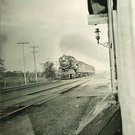If poetry is to matter, it must embody a new way of seeing
To the Editor:
I have just picked up your newest edition (July 13), and come once again upon one of the puzzling contributions by Mr. Dennis Sullivan, who says he is a poet and thus, qualified as a cultural pundit, and now this time, an amateur theologian as well. Which would be OK, if any of it went anywhere.
In the first essay [“As a poet, I’m a handmaiden, a midwife, receiving newborn words into the world, June 8, 2023], Mr. Sullivan writes of a conversation in a coffee shop with a woman who, on learning he is a poet, is over-awed, but also curious about how poetry happens. “I spend my days sitting by the well of silence, waiting for words to be born,” he tells her, to a gush of “wows.”
What strikes me most about Mr. Sullivan, the self-anointed poetus extraordinarius, is his utter lack of humility in his encounter with whatever muse may be his. In a bath of self-congratulation, he seems to stand in very shallow water indeed — no sense of depth, nor anything of the mystery he claims to know so intimately.
The metaphor that discovering words is like “accepting newborns into the world” doesn’t work for me — there is no shapeless clay of language, innocent and unspoiled, before the wicked world of human getting and spending has its way with it. Language that has not been put to the service of describing human experience can have little meaning that matters.
As to his comment “I have no horse in the race,” my response is, “Well, then, dear poet, what the hell are you doing it for?”
And then, about his awestruck fan, “... she really wants to understand how a word is made flesh.” So does he really see himself as a Jesus impersonator? There are phrases that you simply cannot use without bringing their history along.
You either incorporate that history, interpret your observation through this specific lens, or you can’t use the phrase at all. It will never be free of context. Such a statement shouts out: “Forgive him, Father, he knows not what he does.”
If poetry is to matter, it seems to me, it must embody a new way of seeing; it must take us by the hand through the thickets of every day, with insights altogether new, or simply better said. But at its core, poetry must talk about the real things of our lives; it must have values and take positions. It must “have a horse in the race.”
In his latest essay [“The day I became a poet, life and death were one,” July 13, 2023], Mr. Sullivan is responding some three months late to a column in The New York Times by the Rev. Trish Harrison Warren on the history and thinking behind Christian beliefs about the Resurrection. Setting aside that such a response would have been timely at Easter and is now, in July, surely wide of the mark, the piece is a shapeless, protracted ramble with no argument.
He meanders through the story of “doubting Thomas” followed by an assault on anyone who might take the Easter story seriously. He is sure that all of this is foolishness — in a kind of “follow the science” argument that seems to say Thomas was right the first time — while jumbling up language tonalities in a way that serves only to cheapen the material, and to reveal the apparently very heavy, and unexamined, chip on his own shoulder.
For one example, he writes, “The session [on the truth of the Resurrection] was, for the attendees, their ‘rumble in the jungle,’ their ‘thrilla in Manilla’ .”
Whatever you believe about the core rituals and beliefs of Christians, it is not helpful to treat them as silly — after all, they have mattered to people, as have the Greek myths, for over two Millennia — particularly when there is no argument to justify it. Sullivan is sure he knows what “the True Christian believes…” while he, of course, knows better. And all the while, he is still arguing with the nun who taught him the Catechism when he was 10.
Readers of The Altamont Enterprise deserve better.
Dardis McNamee
Rensselaerville
